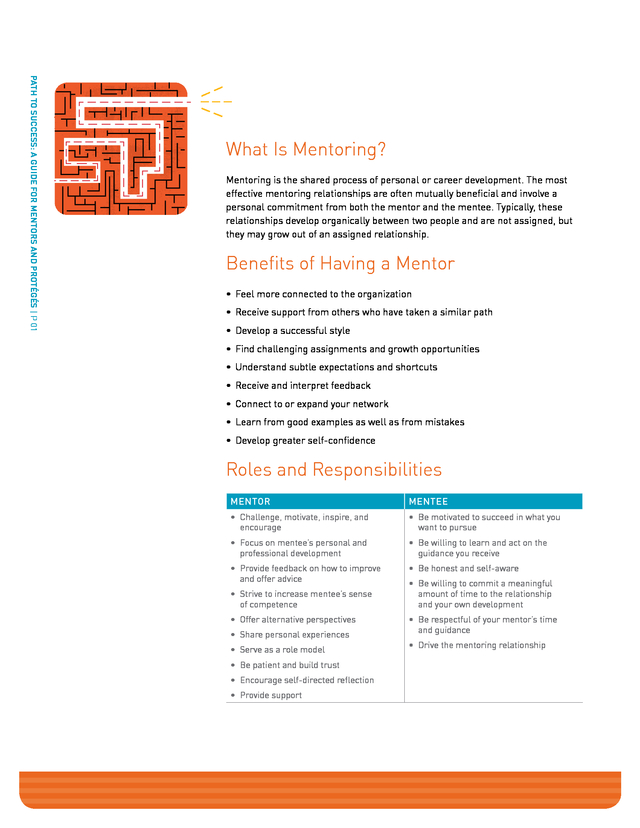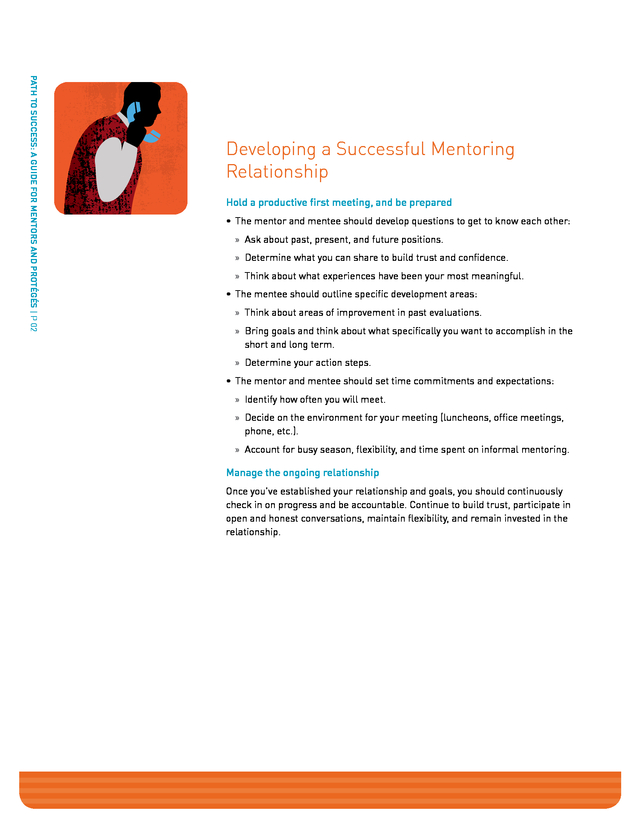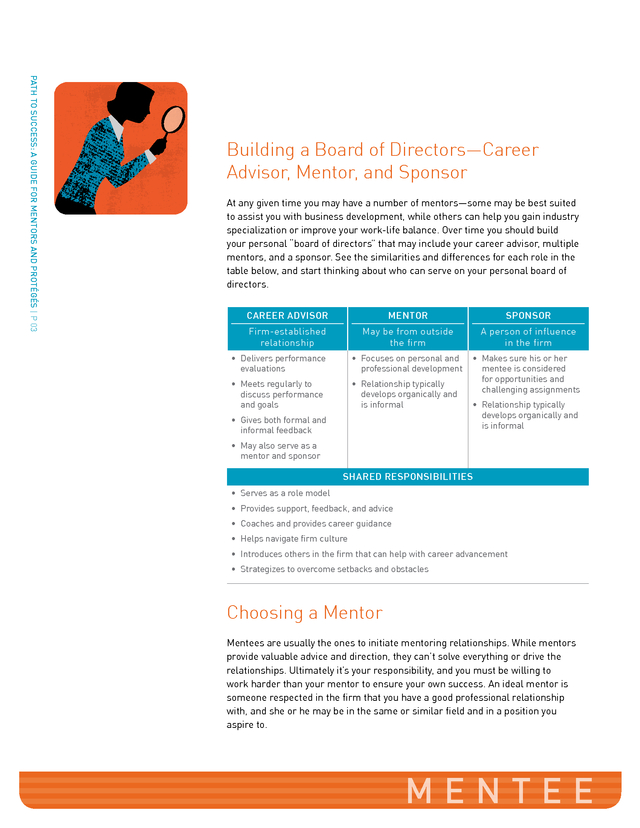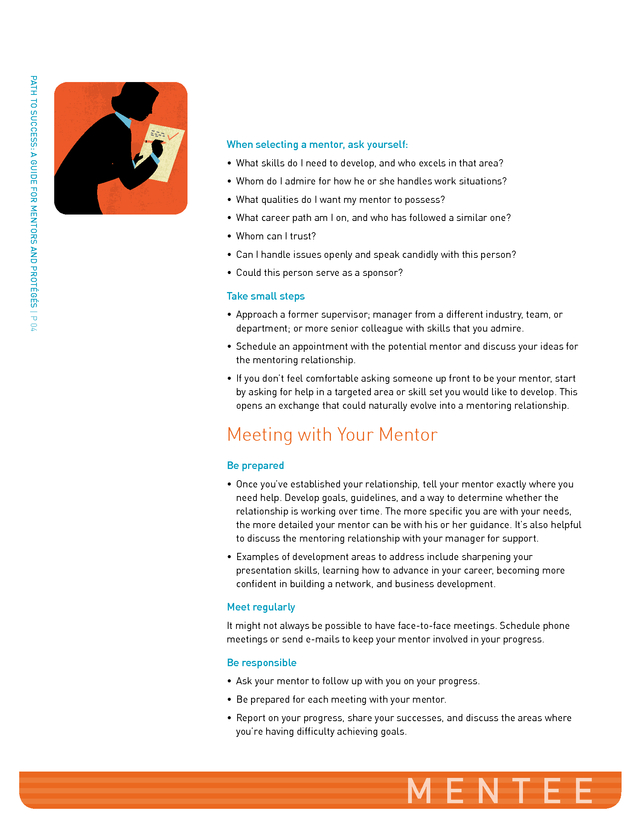Description
Path to Success:
A Guide for Mentors and Protégés
Certified Public Accountants | Business Consultants
Acumen. Agility. Answers.
. Path to Succe ss: A Guide for Mentors and Protégés | P 01
What Is Mentoring?
Mentoring is the shared process of personal or career development. The most
effective mentoring relationships are often mutually beneficial and involve a
personal commitment from both the mentor and the mentee. Typically, these
relationships develop organically between two people and are not assigned, but
they may grow out of an assigned relationship.
Benefits of Having a Mentor
• Feel more connected to the organization
• Receive support from others who have taken a similar path
• Develop a successful style
• Find challenging assignments and growth opportunities
• Understand subtle expectations and shortcuts
• Receive and interpret feedback
• Connect to or expand your network
• Learn from good examples as well as from mistakes
• Develop greater self-confidence
Roles and Responsibilities
mentor
Mentee
• Challenge, motivate, inspire, and
encourage
• Be motivated to succeed in what you
want to pursue
• Focus on mentee’s personal and
professional development
• Be willing to learn and act on the
guidance you receive
• Provide feedback on how to improve
and offer advice
• Be honest and self-aware
• Strive to increase mentee’s sense
of competence
• Offer alternative perspectives
• Share personal experiences
• Serve as a role model
• Be patient and build trust
• Encourage self-directed reflection
• Provide support
• Be willing to commit a meaningful
amount of time to the relationship
and your own development
• Be respectful of your mentor’s time
and guidance
• Drive the mentoring relationship
. Path to Succe ss: A Guide for Mentors and Protégés | P 02
Developing a Successful Mentoring
Relationship
Hold a productive first meeting, and be prepared
• The mentor and mentee should develop questions to get to know each other:
»» Ask about past, present, and future positions.
»» Determine what you can share to build trust and confidence.
»» Think about what experiences have been your most meaningful.
• The mentee should outline specific development areas:
»» Think about areas of improvement in past evaluations.
»» Bring goals and think about what specifically you want to accomplish in the
short and long term.
»» Determine your action steps.
• The mentor and mentee should set time commitments and expectations:
»» Identify how often you will meet.
»» Decide on the environment for your meeting (luncheons, office meetings,
phone, etc.).
»» Account for busy season, flexibility, and time spent on informal mentoring.
Manage the ongoing relationship
Once you’ve established your relationship and goals, you should continuously
check in on progress and be accountable. Continue to build trust, participate in
open and honest conversations, maintain flexibility, and remain invested in the
relationship.
. Path to Succe ss: A Guide for Mentors and Protégés | P 03
Building a Board of Directors—Career
Advisor, Mentor, and Sponsor
At any given time you may have a number of mentors—some may be best suited
to assist you with business development, while others can help you gain industry
specialization or improve your work-life balance. Over time you should build
your personal “board of directors” that may include your career advisor, multiple
mentors, and a sponsor. See the similarities and differences for each role in the
table below, and start thinking about who can serve on your personal board of
directors.
Career Advisor
Mentor
Sponsor
Firm-established
relationship
May be from outside
the firm
A person of influence
in the firm
• Delivers performance
evaluations
• Focuses on personal and
professional development
• Meets regularly to
discuss performance
and goals
• Relationship typically
develops organically and
is informal
• Makes sure his or her
mentee is considered
for opportunities and
challenging assignments
• Gives both formal and
informal feedback
• Relationship typically
develops organically and
is informal
• May also serve as a
mentor and sponsor
Shared Responsibilities
• Serves as a role model
• Provides support, feedback, and advice
• Coaches and provides career guidance
• Helps navigate firm culture
• Introduces others in the firm that can help with career advancement
• Strategizes to overcome setbacks and obstacles
Choosing a Mentor
Mentees are usually the ones to initiate mentoring relationships. While mentors
provide valuable advice and direction, they can’t solve everything or drive the
relationships.
Ultimately it’s your responsibility, and you must be willing to work harder than your mentor to ensure your own success. An ideal mentor is someone respected in the firm that you have a good professional relationship with, and she or he may be in the same or similar field and in a position you aspire to. Mentee . Path to Succe ss: A Guide for Mentors and Protégés | P 04 When selecting a mentor, ask yourself: • What skills do I need to develop, and who excels in that area? • Whom do I admire for how he or she handles work situations? • What qualities do I want my mentor to possess? • What career path am I on, and who has followed a similar one? • Whom can I trust? • Can I handle issues openly and speak candidly with this person? • Could this person serve as a sponsor? Take small steps • Approach a former supervisor; manager from a different industry, team, or department; or more senior colleague with skills that you admire. • Schedule an appointment with the potential mentor and discuss your ideas for the mentoring relationship. • If you don’t feel comfortable asking someone up front to be your mentor, start by asking for help in a targeted area or skill set you would like to develop. This opens an exchange that could naturally evolve into a mentoring relationship. Meeting with Your Mentor Be prepared • Once you’ve established your relationship, tell your mentor exactly where you need help. Develop goals, guidelines, and a way to determine whether the relationship is working over time. The more specific you are with your needs, the more detailed your mentor can be with his or her guidance.
It’s also helpful to discuss the mentoring relationship with your manager for support. • Examples of development areas to address include sharpening your presentation skills, learning how to advance in your career, becoming more confident in building a network, and business development. Meet regularly It might not always be possible to have face-to-face meetings. Schedule phone meetings or send e-mails to keep your mentor involved in your progress. Be responsible • Ask your mentor to follow up with you on your progress. • Be prepared for each meeting with your mentor. • Report on your progress, share your successes, and discuss the areas where you’re having difficulty achieving goals. Mentee . Path to Succe ss: A Guide for Mentors and Protégés | P 05 Tips for Mentors Maintain regular contact Once your mentoring relationship is established, maintain contact through regular meetings. Always be honest Trust is an essential element of the mentoring relationship. Your mentee depends on you for sincere and honest feedback. Don’t expect to have all the answers • You’re a resource and sounding board, not an encyclopedia. If your mentee comes to you with a question or concern that you don’t have an answer for, help your mentee access resources and further support. • When you’re navigating for others, remember that they can’t make the whole trip in a day. Make a list When preparing for your first meeting, make a list of all the things that you would’ve wanted to know when you were in your mentee’s level or position at the firm. Be clear about purpose and boundaries Giving gifts, loaning money, or becoming involved in dispute resolutions should not be part of your mentoring relationship. While you should feel comfortable talking about moral or ethical issues, be clear about ground rules. Listen and ask empowering questions • Suspend judgment and provide a supportive atmosphere with in-depth listening. • Ask powerful questions that can help your mentee talk about and reflect on what’s important and take action. Experiment • Brainstorm, role-play, and use other techniques to help your mentee work through his or her career challenges. Mentor .
Path to Succe ss: A Guide for Mentors and Protégés | P 06 Focus on wisdom • You should see yourself as a resource, catalyst, idea generator, networker, and problem solver while recognizing that you don’t have all the answers. • Share what you’ve done or learned—not as a directive but as an example of something you gained wisdom from. • Contribute ideas or suggestions in a collaborate manner. Maintain and respect privacy, honesty, and integrity While you can’t offer your mentee confidentiality in the legal sense, do your best to say, “what is said in this room stays in this room.” Recognize that many mentoring relationships, particularly assigned ones, will come to an end • Be supportive of your mentee’s moving on to another mentor, and keep in contact for support. • Understand that multiple mentors will be involved in an individual’s career for different periods of time. • Remember that many mentors continue to give advice and share experiences. About Moss Adams Nationwide, Moss Adams and its affiliates provide insight and expertise integral to your success. Moss Adams LLP is a national leader in assurance, tax, consulting, risk management, transaction, and wealth services. www.mossadams.com Moss Adams Wealth Advisors LLC provides investment management, personal financial planning, and insurance strategies to help you build and preserve your wealth. www.mossadamswealthadvisors.com Moss Adams Capital LLC offers investment banking and strategic advisory services, helping you create greater value in your business. www.mossadamscapital.com Discover how we make a difference. Moss Adams is an Equal Opportunity Employer. Mentor .
Ultimately it’s your responsibility, and you must be willing to work harder than your mentor to ensure your own success. An ideal mentor is someone respected in the firm that you have a good professional relationship with, and she or he may be in the same or similar field and in a position you aspire to. Mentee . Path to Succe ss: A Guide for Mentors and Protégés | P 04 When selecting a mentor, ask yourself: • What skills do I need to develop, and who excels in that area? • Whom do I admire for how he or she handles work situations? • What qualities do I want my mentor to possess? • What career path am I on, and who has followed a similar one? • Whom can I trust? • Can I handle issues openly and speak candidly with this person? • Could this person serve as a sponsor? Take small steps • Approach a former supervisor; manager from a different industry, team, or department; or more senior colleague with skills that you admire. • Schedule an appointment with the potential mentor and discuss your ideas for the mentoring relationship. • If you don’t feel comfortable asking someone up front to be your mentor, start by asking for help in a targeted area or skill set you would like to develop. This opens an exchange that could naturally evolve into a mentoring relationship. Meeting with Your Mentor Be prepared • Once you’ve established your relationship, tell your mentor exactly where you need help. Develop goals, guidelines, and a way to determine whether the relationship is working over time. The more specific you are with your needs, the more detailed your mentor can be with his or her guidance.
It’s also helpful to discuss the mentoring relationship with your manager for support. • Examples of development areas to address include sharpening your presentation skills, learning how to advance in your career, becoming more confident in building a network, and business development. Meet regularly It might not always be possible to have face-to-face meetings. Schedule phone meetings or send e-mails to keep your mentor involved in your progress. Be responsible • Ask your mentor to follow up with you on your progress. • Be prepared for each meeting with your mentor. • Report on your progress, share your successes, and discuss the areas where you’re having difficulty achieving goals. Mentee . Path to Succe ss: A Guide for Mentors and Protégés | P 05 Tips for Mentors Maintain regular contact Once your mentoring relationship is established, maintain contact through regular meetings. Always be honest Trust is an essential element of the mentoring relationship. Your mentee depends on you for sincere and honest feedback. Don’t expect to have all the answers • You’re a resource and sounding board, not an encyclopedia. If your mentee comes to you with a question or concern that you don’t have an answer for, help your mentee access resources and further support. • When you’re navigating for others, remember that they can’t make the whole trip in a day. Make a list When preparing for your first meeting, make a list of all the things that you would’ve wanted to know when you were in your mentee’s level or position at the firm. Be clear about purpose and boundaries Giving gifts, loaning money, or becoming involved in dispute resolutions should not be part of your mentoring relationship. While you should feel comfortable talking about moral or ethical issues, be clear about ground rules. Listen and ask empowering questions • Suspend judgment and provide a supportive atmosphere with in-depth listening. • Ask powerful questions that can help your mentee talk about and reflect on what’s important and take action. Experiment • Brainstorm, role-play, and use other techniques to help your mentee work through his or her career challenges. Mentor .
Path to Succe ss: A Guide for Mentors and Protégés | P 06 Focus on wisdom • You should see yourself as a resource, catalyst, idea generator, networker, and problem solver while recognizing that you don’t have all the answers. • Share what you’ve done or learned—not as a directive but as an example of something you gained wisdom from. • Contribute ideas or suggestions in a collaborate manner. Maintain and respect privacy, honesty, and integrity While you can’t offer your mentee confidentiality in the legal sense, do your best to say, “what is said in this room stays in this room.” Recognize that many mentoring relationships, particularly assigned ones, will come to an end • Be supportive of your mentee’s moving on to another mentor, and keep in contact for support. • Understand that multiple mentors will be involved in an individual’s career for different periods of time. • Remember that many mentors continue to give advice and share experiences. About Moss Adams Nationwide, Moss Adams and its affiliates provide insight and expertise integral to your success. Moss Adams LLP is a national leader in assurance, tax, consulting, risk management, transaction, and wealth services. www.mossadams.com Moss Adams Wealth Advisors LLC provides investment management, personal financial planning, and insurance strategies to help you build and preserve your wealth. www.mossadamswealthadvisors.com Moss Adams Capital LLC offers investment banking and strategic advisory services, helping you create greater value in your business. www.mossadamscapital.com Discover how we make a difference. Moss Adams is an Equal Opportunity Employer. Mentor .























